Solar Realms Elite (SRE) was written in 1990–1994 for BBS systems running on IBM PCs.
How to run it in 2025:
- Download a DOSBox-ready version. Alternatively, download SRE 0.994b or another version[1] (thanks to Josh Renaud for finding these old versions!).
curl -O http://www-cs-students.stanford.edu/~amitp/games/sre/sre-dosbox-ready.zip unzip sre-dosbox-ready
- Install DOSBox[2], a DOS emulator that can run SRE. On Linux, DOSBox is available in many package managers. On Windows, there’s an installer[3]. On Mac, brew install dosbox-staging.
- Run DOSBox. On Linux, run dosbox. On Mac, $(brew --prefix)/bin/dosbox-staging.
- Inside the DOSBox:
MOUNT C solar-realms-elite C: UNPACK -y SRDOOR LOCAL
Put in any name. - Run INSTALL and choose option 24: Local only.
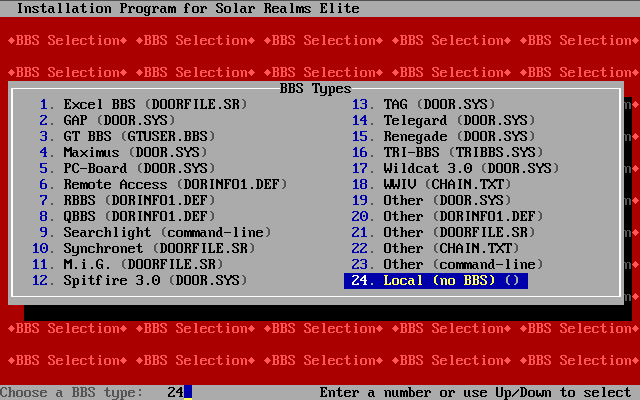
- (Optional) Initialize the game to customize the settings. There is a Y2k bug that leads to Sorry, this game has not been reset; the workaround is to change the clock temporarily only for the
RESETstep:DATE 12/31/1999 SRE RESET
The rest of the game will work with the current date. Optionally change the clock back to the present.
- (Optional) Use a crack to register the game.
- Run SREREG-8. Copy the code somewhere.
- Run SRE REGISTER. Enter the codes.
- Each time you want to play, run the DOSBox and then
# Inside the dosbox MOUNT C solar-realms-elite C: SRE
The first time you run it, it will be simulating from 1999 to the present, so it may take longer.
The documentation files and title screens are in CP437 encoding. You can use iconv -f CP437 filename to convert them to UTF-8. Examples: WHATS.NEW (SRE II) and WHATS.OLD (SRE I).
If I had the source code, I’d give it out for free, but I don’t have it anymore. Other notes I have about the game:
The rest of this document is for players.
Interstellar Imperialists
Written in 1990-1994 by Amit Patel[4] in Borland C++ 3.1 (Borland International)
Send comments, suggestions, and bug reports to:
Amit Patel
amitp@cs.stanford.edu
To get started

In Solar Realms Elite (SRE), you rule a solar empire. The goal is to become and remain the most powerful empire. You can gain strength by buying forces, and you can gain size by colonizing planets. You start with 6 planets, and a little bit of money. You are required to feed your people and army, and to pay to maintain your planets and army. If you fail to do these things, disastrous results may occur. You are given 20 years (“turns”) of protection, during which you can not attack or be attacked. You can not perform covert operations (except Spy). This provides a way for smaller empires to build up their defenses and planets before they enter the “real world”.
A note on time units in SRE: Turns and Years are game time; Days and Hours are real time
Game Menu
The main options you should be concerned about at first are [9] Diplomacy, and [4] Play Game. Diplomacy is discussed next, and then the play sequence.
Diplomatic Relations
- Neutrality Treaty - This is a treaty with another empire that will prevent you from being attacked by the other empire. It also allows trading.
- Free Trade Agreement - This treaty will also protect you from being attacked by the other empire if for more than 0 days. This treaty also will earn money from tariffs from trade with the other empire.
- Minor Alliance - This treaty will not only protect you from the other empire’s attacks, but the other empire will also send you defensive forces when you are attacked. You will automatically send him or her forces when he/she is attacked also.
- Total Defense - This is the same as the Minor Alliance, but each of you will send more forces in defense than in a Minor Alliance.
- Armed Defense Pact - This is a Total Defense pact that only applies to soldiers sent in defense, but more soldiers are sent with the Armed Defense Pact than with the Total Defense.
- Cruiser Protection Plan - The heavy cruisers of both empires patrol the planet areas of both empires, to provide protection. Light cruisers do not contribute.
- Break Treaty - This will automatically break ANY treaty. BUT, if the treaty is for more than 0 days, the treaty is not broken until the other empire plays and learns of it.
- View Relations - This gives you a list of relations with other empires.
- Other Treaty - If you do not like the defense plans listed above, you may make your own defense treaty with this option. You can set the percentage of soldiers and heavy cruisers sent when your ally is attacked. These custom treaties are like defense treaties (#3-#6); you do not get the special bonuses of Neutrality or Free Trade.
A treaty is used to ensure protection with your allies. You can propose one of the 7 types of treaties with another empire, and if the empire accepts the treaty, you two will be friendly for a period of time. If you specify a length of time for the treaty to be obeyed, during that time, the treaty is binding. The other empire may not attack you or perform covert operations on you. Likewise, you are prohibited from attacking or performing covert operations on the other empire. When the treaty expires, or if you specify 0 days for the length of the treaty, the treaty still exists between your empires, but an attack or covert operation is not strictly prohibited. Performing one of these actions immediately cancels the treaty. Breaking the treaty is also immediate if the treaty has expired. Use of these treaties allows small empires to bond together or with larger empires. Also, trading is only allowed with empires you have relations with (by having a treaty). Both the Neutrality Treaty and the Free Trade Agreement are meant to allow trading and to show good faith without making a commitment of forces for defense. A guerilla ambush, however, is a surprise attack, and military defense treaties do not help the defender.
Game Play
When you select option [4], “Play Game”, you can play up to 5 turns (per day) of ruling your empire. The game flow is illustrated by this diagram:
[4] Play Game
|
Lottery (Registered version only)
|
+-> Reports on the earnings from planets and other sources of income
| |
| Status screen (shows the state of your empire)
| |
| Maintain your empire
| |
| Feed your people
| |
| Covert operations, if you have covert agents
| |
| Bank (Registered version only)
| |
| Government Spending <----------> Operations Menu
| | |
| | |-Messages
| | |
| | |-Bank
| | |
| | |-Covert operations
| | |
| | |-Trading
| Battles |
| | +-Status Screen
| Trading
| |
| Change in population / end of turn status
+---+
Earnings

The game will show you what each type of planet produced. It also shows you the amount you made in taxes. For supply planets, it shows the amount of each type of military unit that was added to your forces. Petroleum and anti-pollution planets also report the change in the amount of pollution in your atmosphere.
Payments
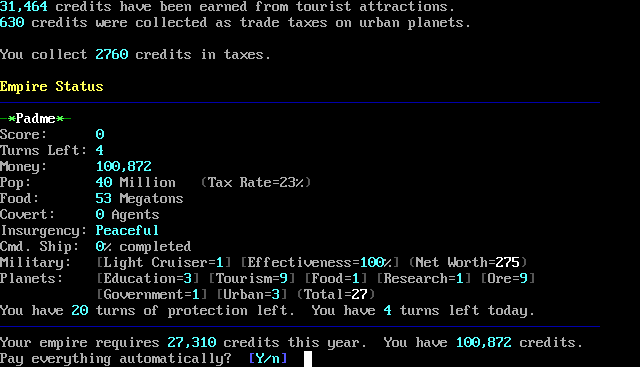
You will be prompted to pay your forces, your planets, the bank (to repay a loan), and taxes to the Galactic Coordinator. In the registered version, you can visit the bank before you do this to get extra funds if necessary. If the system determines that you can afford to pay everything fully, it will ask you whether you want to pay it all at once, and if you do, it will not ask you to pay for each item individually.
- NOTE
- The number in brackets [] is the default. If you press RETURN, the default will be used. If it shows as [MAX=####], it is the maximum; default 0. If you press >, it enters the maximum number for you. Pressing K or M enters 3 or 6 zeros for you. You can also use % to enter a percentage of the maximum value.
Food Market

In the Food Market, which is owned and operated by the Galactic Coordinator, you can buy or sell food. Your people and army require food each turn; if you have extra food, you can sell it to the market. If you do not have enough, you can buy food. The default amount to buy is the amount that you need to feed everyone this year; if you can feed them all, the default is to buy 0.
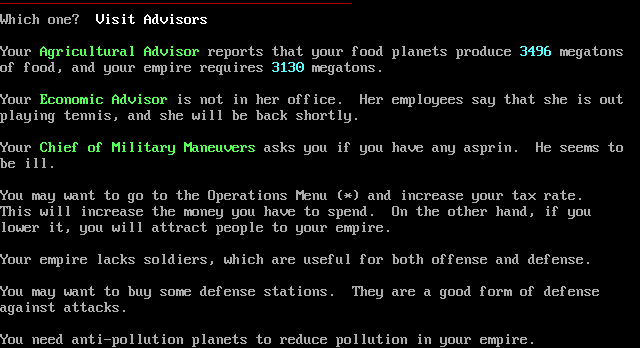
Your advisors will warn you if they believe that you are running out of food.
Covert Operations

Here are the options in this menu:
-
Send Spy
You can get information about another empire, similar but less detailed than your own status screen. Spying may not always be successful, but you can guarantee that you can get a spy report by bribing a spy in the other empire (see option 9). You can spy as many times as you like. -
Insurgent Aid*
By sending rebellious troublemakers and pamphlets an opponent empire, you can increase the internal violence in that empire. To restore peace may be costly or impossible for the other emperor, and may cause civil war. The violence in the other empire will cause tourism profits to decrease and the population to drop. Insurgent Aid can be attempted once per turn per empire. It’s harder to do Insurgent Aid if the other empire is already in civil disorder. -
Set up*
Your spies send reports to empire B that it was attacked by empire A. Although the two empires may have been at peace prior to your meddling, empire B will believe that he was attacked by empire A. Empire A may deny it, but there won’t be a way to prove it. The operation can be performed once per day to the empires. You cannot set up empire A with empire B and then empire A with empire C on the same day, but you can set up A and B and then C and D. Your spies will wait until the “attacker” player plays before performing this operation; that way, the time of the attack will be during the time that the emperor played his turns. -
Support Dissension*
Your spies will encourage the opponent empires’s soldiers to desert their posts. This operation can be performed once per day per empire. Your spies will not attempt the action for 12 real hours. -
Demoralize Troops*
By sending distractions and interruptions to the target empire, you can reduce the training efficiency of their soldiers and reduce the effectiveness of the army. You can demoralize troops of each empire only once per day. Your spies will not attempt the action for 12 real hours. -
Bombing Operations*
Your spies can booby-trap the target’s food supplies. Some or all of the food may be blown up. This is useful in starving another empire to death. You can bomb the food supplies of each empire only once per day. -
Relations Spying*
Your agents discover the treaties held by another empire. You can perform this action as many times as you like. -
Take Hostages*
Your terrorist spies capture a prominent official from the other empire and demand a sum of money for his or her return. The opponent emperor is forced to pay the fee, and you will receive the money. Taking hostages can be done once per day per empire. The terrorists wait 12 real hours before performing the action. -
Bribe Personnel*
After bribing a spy in the other empire, you can be guaranteed spy reports without fear of your spy being captured.
Starred items are only available when NOT in protection.
Solar Bank

If your sysop is running the REGISTERED version, and the bank is enabled, you will enter the bank. You can deposit credits as a savings account, on which you will earn interest, or get a loan, which you will have to make yearly payments. Each year, interest is accumulated on a savings account or on a loan. Early payback of a loan reduces some of the interest costs. You can also invest in Galactic Coordinator Bonds. They cost 8500 credits and they return 10,000 credits after some amount of time.
Government Spending
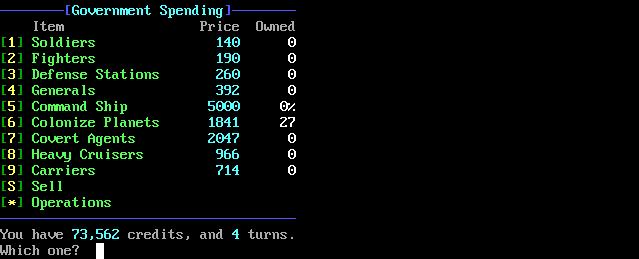
You will then come to the government spending menu. You have the option of buying various forces. Some are defensive, and others are offensive:
| Soldiers | Defensive and Offensive |
| Fighters | Offensive |
| Defense Stations | Defensive |
| Heavy Cruisers | Defensive and Offensive |
You can also Colonize Planets:
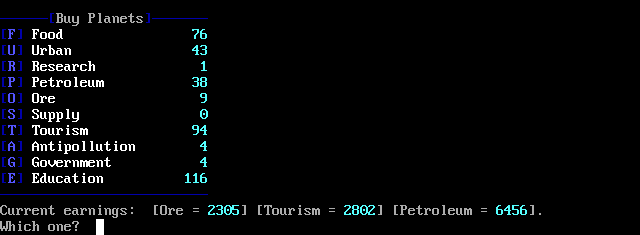
- Food
- On these planets, huge farms produce food, which is required for your empire to survive. An alternative to having food planets is to buy from the food market each year, but the risks are that the supply of food in the food market may run out. Having a food planet is safer, but costs more than buying food from the market. Having too many food planets leads to food surpluses, which can be sold for low prices to the market, or saved for a later time.
- Ore
- A stable source of income, ore planets continue to function even during wars and domestic troubles. They can be valuable if your tourism planets are not producing a good income during troubled times.
- Tourism
- Producing more money (on average) than ore planets, the tourism planets depend upon the tourists spending money. During periods that your empire is not PEACEFUL (such as after a civil war), the tourist attractions earn very little or nothing. Too many tourism planets can cause your empire to be dependent on peaceful times, and the empire can easily collapse if you do have internal troubles.
- Supply
- Supply planets can produce military at a lower cost than buying them. They are also more convenient, because they keep producing military constantly. You can set the balance of production by entering the Operations Menu and choosing “Supply Planet Production”.
- Government
- The base of the government agencies, these planets house the generals, who not only are military commanders, but are important political figures as well. They set up bases of operations for which they required 1/50th of the planet’s usable land area. Therefore, 50 generals can use a single government planet. The covert agents also roam these planets, and having over 300 spies on one planet causes them to fight each other for territory, leading to internal conflicts.
- Education
- Educational planets have large universities to which students come from independent planets, where the educational facilities are not as large as those that your empire can afford. After seeing your empire’s resources and power, most of the students remain in your empire to add to your general population.
- Research
- These planets are set up as scientific research laboratories in which developments may or may not occur. If a breakthrough occurs, it may benefit your empire and give you an edge over other empires that do not have your technology. The benefits are reported to you before the first status screen. They include such things as proteins to increase crop yield on food planets to new tourist attractions that increase tourism planet revenues. Some of the benefits will last forever and others are only temporary.
- Urban
- Urban planets are devoted to housing people. Since every city has internal commerce in the form of stores, fuel docks, and other services, the urban planets earn revenue in the form of sales taxes. Urban planets also increase the population of your empire, and as a result, increase the income taxes earned from your people. Don’t underestimate their power --- even though they seem to do very little at first, they become more influential the longer you’ve had them.
- Petroleum
- These planets supply petroleum (oil) to the galaxy. All planets in the galaxy require petroleum to run machinery and vehicles. If there are few petroleum planets, the demand for oil will be higher and the income per petroleum planet will be higher. If there are too many of these planets, the price of oil will drop, and so will profits. One problem of petroleum planets is high pollution.
- Anti-Pollution
- Anti-pollution planets are completely covered with forests and jungles to absorb the toxic chemicals released into the galactic atmosphere by petroleum planets. Pollution causes reduced tourism, so the anti-pollution planets are neccessary to keep tourism active and also to reduce emmigration.
You can build a command ship, which will add power to your heavy cruisers during battle. Light cruisers fight without the command ship’s coordination. The command ship’s strength increases by 5% automatically (at no cost) each turn. You can also build it up by spending money (to build faster). In battle, one general is required to command every 50 soldiers. One carrier is needed to transport 100 fighters to the site of conflict. Alternatively, if your research planets have produced a mothership, it can carry 100,000 fighters, so that you do not need carriers for this. (Carriers are still useful for trading.)
You may also buy covert agents, which allow you to perform immoral acts on other empires, such as spying, encouraging soldiers to dissent, taking hostages, setting up two empires against each other, reducing another army’s effectiveness with distractions, and aiding rebels to produce internal conflicts. Covert agents are very useful to bring down a large empire if you are a small empire.
You can also sell any item except a planet or the command ship for one-third of the current price. When you sell a planet, you can release it, but you will not receive any money for it.
Operations Menu
The operations menu can be accessed by pressing [*]. The system menu allows you to go back to the bank or covert operations menu. It also lets you see your status screen or the scores. You can buy a Super Lottery Ticket in this menu. One Super Lottery Ticket is selected at the end of the day to be the winner. All players will be notified of the winner of the jackpot. From the system menu, you can configure the game to your suiting (like choosing short/long descriptions, report dates, etc.), see the intructions (this file!), check waiting trade deals, abdicate (who’d want to do that?), and set the taxation rate (the percentage your police steal from each person’s pocketbook every year), and set a draft rate (to draft people into your military for defense against an attack).
Battles

After you are finished spending, you are given the option to attack another player. You cannot attack a player that is in protection; you cannot attack if you are in protection, unless you wish to void your protection. To void your protection, you are required to be a large enough empire with an adequate defense force. You are not allowed to attack an empire that you have a binding treaty with. Treaties that have expired but that are still in effect are no longer binding, and attacking that empire will cancel the treaty.
- Conventional Attack
-
The normal way to attack another empire, the conventional attack uses your soldiers (led by generals), fighters (taken to battle by carriers), and heavy cruisers for battle and looting. If you win, you can capture some of the opponent’s planets and take some of the money. The battle comes after a declaration of war, so the opponent has time to call her or his allies for defense. This is the only honorable way to fight another empire.
There are three fronts fought simultaneously during a conventional attack. Soldiers will fight on the ground against enemy soldiers; fighters will attack the defense stations, which will fire back at your fighters; these battles take place in the space around the planets. Heavy cruisers battle in deep space against each other. Light cruisers fight alongside with heavy cruisers, but they do not get the attack bonuses that the command ship gives to heavy cruisers. However, light cruisers get five bonus rounds of firing at their opponents before the opponent can fight back. Your soldiers are not very effective in taking out defense stations or cruisers, but are crucial to your control of the planets. Fighters can fight soldiers, but are not able to do much damage; they can do very little damage to cruisers. The heavy cruisers are meant for deep space; although they can approach planets, their energy is spent maintaining orbit or maneuvering rather than fighting, so they are not able to do very much damage to defense stations or soldiers.
The best strategy to minimize your losses and to have the best chance of winning is to match your opponent’s army on each front. An army based solely on fighters will be devastated if the enemy has soldiers and cruisers; you need to control two of the three fronts to win. You may wish to use covert agents to determine the type of military held by your opponent before choosing what offensive you wish to use.
- Guerilla Ambush
This somewhat immoral act is a surprise attack on the opponent that allows no warning, so the victim empire has no time to call allies. Also, the soldiers are randomly shooting at the enemy, so no generals are needed to lead them. There is no good way of knowing the enemy casualties, and no planets can be captured. However, fear can be spread in the civilian areas of the opponent’s empire, and some of the soldier defenses can be weakened. There is a risk that the opponent will capture a few of your soldiers and discover your identity; otherwise your attack will go unnoticed.
- Nuclear Offensive
Rumours have spread concerning nuclear weapons that are being sold on the black market, now even in our galaxy. The Galactic Coordinator is currently trying to destroy the sources of these weapons. It may be a while before you are able to get nuclear weapons, if at all. Nuclear weapons can spread radiation and make dead planets from productive ones. Naturally, any empire caught using nuclear weapons will be punished or eliminated by the Galactic Coordinator. If you think you can withstand the force of The Galaxy’s forces, and you have hired enough covert agents to look for the weapons, you can take the risk...
- Chemical Warfare
Poisonous chemicals have been banned in our galaxy, but exist in many of the barbaric galaxies in the universe. Occasionally these chemicals are brought to our galaxy for causing human misery. Due to the highly uncivilized nature of these weapons, the Galactic Coordinator is tightly enforcing the ban. If you found even possessing chemicals that can be used for chemical warfare, you will be instantly annihilated by The Galaxy’s army. Don’t even think of using these.
- Psionic Bombs
While normal attacks are targeted towards normal physical destruction, these bombs target the mind. The population of your opponent will be thrown into anarchy as mass confusion and havoc reigns. In addition, your opponent’s soldiers will be totally demoralized.
- Pirate Raid
If you pay attention to the events that occur before the status screen, you may notice that various teams of Pirates take some of your military, covert agents, planets, food, or money. You can raid these foes from the attack menu by sending a military and lots of money to capture back some of their goods. Included in the items you capture may be items that they have captured from other empires.
- Spy on Pirates
If you don’t know which pirates are good to attack, you can spend your attack turn spying on all of the pirate teams. There is no cost for spying on the pirates, and you find out their number of planets and net worth.
Trading
After you have finished in the battle section, you may trade with another empire. You can trade with any player that you have a treaty with, even if the treaty has expired. You can choose how much you would like to send to the other empire, and how much you will demand in return. If you are generous, you may wish to send items without demanding anything in return. Trading requires enough carriers to carry everything you send and to carry everything that will be sent back.
Note that empires in protection have guaranteed non-interaction status. “Interaction” includes trading, attacks, and covert operations, so you cannot trade with empires under protection.
Insurgencies
When other empires perform covert operations on you, you go through civil war, you are ambushed by guerilla forces, or your people riot due to high taxes, you may experience insurgencies within your empire. There are 8 levels of insurgencies, listed in increasing order:
- Peaceful
- Your empire is internally in peace, and all operations are proceeding normally.
- Mild Insurgencies
- Peaceful demonstrations might disrupt tourism, and faith in your empire is slightly weakened.
- Occasional Riots
- Small riots break out in your empire; many people refuse to pay taxes, and your empire’s income is lower. The conditions also reduce the number of people coming to your empire and may increase the number leaving.
- Violent Demonstrations
- Large groups of your subjects participate in riots and demonstrations. These severely affect the flow of tourists in your empire; your tourism industries suffer. Universities, harboring many dissidents, attract fewer people to your empire.
- Political Conflicts
- Officials within your government begin to take sides, causing factions to form and causing supporters to fight each other. Some of your industries are devastated by the conditions in your empire.
- Internal Violence
- Top officials begin to question your authority; many of them form factions, intending to take political power. Massive riots leave your empire in ruins.
- Revolutionary Warfare
- Government officials organize large scale military units to bring the threat of civil war into the heart of your empire. Your empire is avoided by tourists and students; people flee in masses.
- Under Coup
- Your command position is in jeopardy; you have little control of your military except when you can convince them to attack an outside foe. Income from tourism, taxes, and urban trade is gone, and your population is decreasing rapidly. Unless you bring stability to your empire, it will crumble soon.
Final Status
The final status screen will then be displayed. This screen tells you how much your population has changed, and in what ways. People leave and die when you have internal conflicts, and they come and are born when your empire is running well. The immigration rate is increased by getting education planets, and the birth rate increases with urban planets. The death rate increases with overcrowding, and the emmigration rate increases with violence in your empire. Also shown on this screen are losses from a civil war, if you have one.
Messages
Many times, you may wish to send messages to other empires in the game. From the Game menu or the Operations menu, you can send messages (item [7] on the menu). Messages can be either private (email) or public (posts).
If you wish to post a message that everyone will see, you can press * as the destination of the message. If not, you can specify the empires you wish to send to by entering their empire letters. To see a list, press ?. You can also toggle all empires by pressing Z; you can turn off an empire that you have already entered by pressing the same letter again. (This is the same interface as the one for treaties, except here you can also press *.) Press RETURN to stop toggling players and to start writing the message.
Each time you start a new line of the message, the current line number is displayed. You can type up to 99 lines in each message. Enter a line with just “/S” on it to end the message. You can choose to make the message anonymous if you wish.
Strategies
As if this weren’t enough, you will also need to think about your strategies. The types of planets you buy will probably be the most influence in determining how successful you are (for a while, at least). Some players go for Tourism because it makes a lot of money; others go for Ore since it is stable and does not lose profits when your empire goes through civil war. Others like Education and Urban planets and collect high taxes. There are many other strategies available to you, so explore the possibilities!
A Note from the Galactic Coordinator (It)
“Asks you-Why does It collect taxes? It have to fund the food market. It run a communications network that gives all empires free message transmissions and free notices when they attacked. It also have to pay the losses on the Super Daily Lottery, 12% of each day’s prize comes out of Its money. Then maintain an army It must to stop you big empire from using chemical and nuclear weapons; It to protect empires under ‘protection’ supply security; It also spend money stopping bad trader men. On humans It spend a lot of time and money providing, so taxes a little you should pay.” -- Galactic Coordinator
(don’t tell It that It has bad sentences -- It’s struggling with English.)
That’s about all! Enjoy the Game!
Amit Patel, programmer